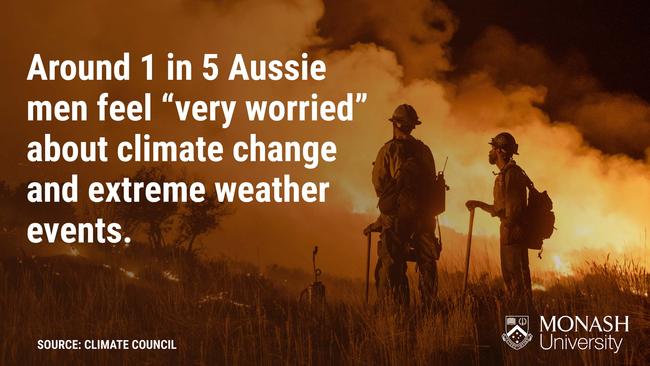Climate change taking a toll on men's health
Men's physical and mental health are at stake as climate change intensifies.

Hyperlocal
Don't miss out on the headlines from Hyperlocal. Followed categories will be added to My News.
As we shine a spotlight on men's mental health this Movember, research shows Aussies are facing a new form of anxiety
One in five Aussie men feel "very worried" about climate change and extreme weather events according to recent data.
This worry – often referred to as 'eco-anxiety' – is a chronic fear of environmental doom that is becoming increasingly common.
And as temperatures continue to rise, cases of eco-anxiety will likely grow as well.
Australia is facing unprecedented environmental challenges, with higher temperatures, more extreme weather, and shifting conditions due to climate change.
In fact, we only need to step out the front door to see some of these changes on the Fraser Coast.
For example, the coldest spring day is now around 2.3C warmer than in the early 1970s.

The mental strain of climate change
One of the key drivers of eco-anxiety is exposure to extreme weather events, either in-person or through the media.
Since 2019, 80 per cent of Aussies have experienced some form of extreme weather disaster.
More than half of these people feel their mental health has been impacted.
Some of the most commonly reported impacts include anxiety, sleep disruption and depression, alongside relationship and alcohol problems.

Extreme weather events are only set to become more frequent and intense, putting more people at risk and in need of support.
On top of extreme weather, climate change can lead to job loss, forced migration, and be detrimental to community wellbeing.
Feeling hot under the collar
Particularly in industries like agriculture, mining and construction – key employers of Aussie men – these changes pose risks not only to the economy and the planet, but also to men's mental and physical health.
Working in these vulnerable industries is often physically demanding, with long hours spent feeling the heat.
Heat kills more Australians than any other environmental disaster.
It can cause serious health problems like heatstroke and heat exhaustion, trigger sudden events like a heart attack, or worsen existing medical conditions like lung or kidney disease.
Climate change will only increase these risks, with more hot days and extreme heatwaves on the cards.
Even at lower levels, long periods of heat exposure have been shown to decrease cognitive and motor skills, and in turn make workplace accidents more likely.
In fact, it's estimated that around 2.3 per cent of occupational injuries in Australia happen for this very reason.
Unfortunately the challenges don't end there, with climate change also taking a toll on the mind.
Strength in the face of change
Movember is the perfect time to champion men's health and challenge the underlying stigma.
If you're feeling anxious about the future, consider having a chat with a mate, family member, or a professional.
At work, whether in an office or under the sun, look after yourself by keeping cool and staying hydrated.
Wider industry support will also help tackle the impacts of our changing climate.
This could include training for workers to transition into more climate-resilient sectors like renewables, to safeguard jobs.
As the moustaches grow this Movember, let's grow the conversation too – check in, stay cool, and tackle men's health and climate change together.
Want more information on how your climate is changing? Check out the last article in this series.
Mandeep Singh is a Senior Project Officer at the Monash Climate Change Communication Research Hub.
This column is part of a collaboration between Monash University and News Corp to deliver hyperlocal weather and climate information.

